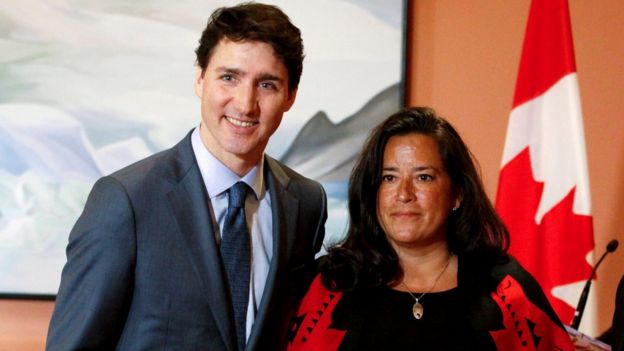
This article is more than
6 year old
But he said he should have been aware of an "erosion of trust" between the minister and his office.
Jody Wilson-Raybould says she was pressured in the criminal prosecution of engineering giant SNC-Lavalin.
Fallout from the affair has cost the prime minister two top ministers.
Mr Trudeau's statements on Thursday morning comes amid a deepening political crisis for the prime minister, with numerous opinion polls suggesting that confidence in his government has taken a hit.
He admitted he had made mistakes in his handling of the matter and that "there are lessons to be learned from this situation". But he said there was no wrongdoing in the SNC-Lavalin case.
"I can repeat and reassure Canadians that there was no breakdown of our systems, of our rule of law, of the integrity of our institutions," he said.
His former attorney general and justice minister Wilson-Raybould has said that she faced attempts at political interference and felt pressured by the prime minister and members of his inner circle over when to make a deal that would have suspended prosecution against the firm.

In those various meetings, they repeatedly raised concerns about the possibility of job losses and potential political ramifications of a trial, she said.
The Quebec-based firm is one of the world's largest engineering and construction companies.
SNC-Lavalin is facing allegations that former executives paid bribes to win contracts in Libya under Muammar Gaddafi's regime, which fell in 2011.
In Canada, the attorney general is supposed to exercise independent prosecutorial discretion, without any political interference. She resigned her cabinet position in February.
Speaking to journalists in Ottawa, Mr Trudeau said Ms Wilson-Raybould did not come to him with concerns about political pressure "and I wish she had".
He also said he never raised "partisan considerations" with the former minister.
Mr Trudeau said he and senior aides were concerned about economic ramifications of a trial and wanted the former attorney general.
They had pushed her to seek outside legal advice on whether SNC-Lavalin could enter into a deferred prosecution agreement.
That agreement would have allowed the firm to avoid a criminal trial and instead agree to alternative terms or conditions, like penalties or enhanced compliance measures.
A conviction could result in a decade-long ban on bidding on Canadian federal contracts, which would be a major financial blow to the firm.